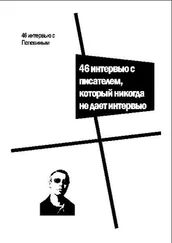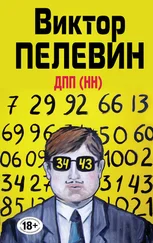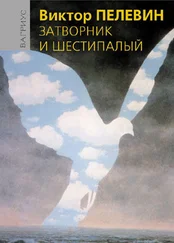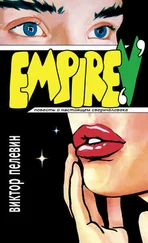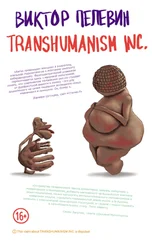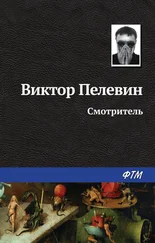Виктор Пелевин - Babylon
Здесь есть возможность читать онлайн «Виктор Пелевин - Babylon» весь текст электронной книги совершенно бесплатно (целиком полную версию без сокращений). В некоторых случаях можно слушать аудио, скачать через торрент в формате fb2 и присутствует краткое содержание. Жанр: Современная проза, на английском языке. Описание произведения, (предисловие) а так же отзывы посетителей доступны на портале библиотеки ЛибКат.
- Название:Babylon
- Автор:
- Жанр:
- Год:неизвестен
- ISBN:нет данных
- Рейтинг книги:5 / 5. Голосов: 1
-
Избранное:Добавить в избранное
- Отзывы:
-
Ваша оценка:
- 100
- 1
- 2
- 3
- 4
- 5
Babylon: краткое содержание, описание и аннотация
Предлагаем к чтению аннотацию, описание, краткое содержание или предисловие (зависит от того, что написал сам автор книги «Babylon»). Если вы не нашли необходимую информацию о книге — напишите в комментариях, мы постараемся отыскать её.
Babylon — читать онлайн бесплатно полную книгу (весь текст) целиком
Ниже представлен текст книги, разбитый по страницам. Система сохранения места последней прочитанной страницы, позволяет с удобством читать онлайн бесплатно книгу «Babylon», без необходимости каждый раз заново искать на чём Вы остановились. Поставьте закладку, и сможете в любой момент перейти на страницу, на которой закончили чтение.
Интервал:
Закладка:
‘Don’t pile it on,’ said Tatarsky. ‘I’ll be sick. I’ll call you back later, OK?’
‘OK,’ agreed Gireiev.
‘Hang on. Why’d you give me that sentence and not a mantra?’
‘What’s the difference? In that state it doesn’t matter what you recite. The main thing is to keep your mind occupied and drink as much vodka as possible. Who’s going to give you a mantra without conferring it properly anyway?’
‘So what does the phrase mean?’
‘Let me have a look. Where is it now… Aha, here it is. ‘Od melafefon bva kha sha.’ It means "Please give me another cucumber". What a gas, eh? A natural born mantra. Of course, it starts with "od", not "om", I changed that. And if you put "hum" at the end as well…’
‘OK, OK" said Tatarsky. ‘Cheers. I’m going out for some beer.’
It was a clear, fresh morning; its cool purity seemed to conceal some incomprehensible reproach. Tatarsky emerged from the entrance-way of his house and stopped, absorbed in thought. It would take him ten minutes to walk as far as the round-the-clock shop he normally went to for hangover remedies (the local winos called it ‘the round-the-bend place’) and the same amount of time to get back. Close by, just a couple of minutes away, were the kiosks in one of which he had formerly worked. Since then he hadn’t gone anywhere near them, but he had no time right now to worry about any vague, ill-defined fears. Struggling against his own reluctance to carry on living, Tatarsky set off towards the kiosks.
Several of them were already open, and there was a newspaper stand beside them. Tatarsky bought three cans of Tuborg and an analytical tabloid - it was one he used to look through for the sake of the advertising spreads, which aroused his professional interest even in a severely hung-over state. He drank the first can while he leafed through the tabloid. His attention was caught by an advertisement for Aeroflot showing a married couple climbing up a gangway set against a palm tree laden with paradisaical fruit. ‘What idiots,’ Tatarsky thought. ‘Who advertises themselves like that? Someone needs to fly to Novosibirsk, and they promise him he’ll end up in heaven. But maybe he’s not due in heaven just yet; maybe he’s got business in Novosibirsk… Might as well invent an "Icarus" airbus…’ The next page was taken up by a colourful advertisement for an American restaurant on Uprising Square - a photograph of the entrance with a jolly neon sign blazing above it:
BEVERLY KILLS A CHUCK NORRIS ENTERPRISE
Tatarsky folded up the newspaper, laid it flat on a dirty crate standing between the kiosks, sat down on it and opened up the second can.
He felt better almost immediately, in order not to look at the world around him, Tatarsky fixed his gaze on the can. There was a large picture on it under the yellow word ‘Tuborg’: a fat man in braces wiping the sweat from his forehead with a white handkerchief. Above the man’s head was a searing expanse of blue, and he was standing on a narrow track that led away beyond the horizon; in short, the picture was so heavily loaded with symbolism that Tatarsky couldn’t understand how the thin aluminium of the can could support it. He automatically began composing a slogan.
‘Something like this,’ he thought: ‘Life is a solitary journey beneath a scorching sun. The road we walk along leads to nowhere; and no one knows where death lies in wait. Remembering this, everything in the world seems empty and meaningless. And then - enlightenment. Tuborg. Prepare yourself. Variant: Think final.’
Part of the slogan could be written in Latin - Tatarsky still had the taste for that going back to his first job. For instance, ‘Halt, wayfarer’ - something-something viator. Tatarsky couldn’t remember precisely; he’d have to look it up in his Inspired Latin Sayings. He rummaged in his pockets to find a pen to note down his creation. There wasn’t one. Tatarsky decided to ask a passer-by for one and he looked up. Standing there right in front of him was Hussein.
Hussein was smiling with the corners of his mouth, his hands were thrust into the pockets of his broad velvet trousers, and his gleaming oily eyes were quite expressionless - he was just surfacing from a recent fix. He’d hardly changed at all, except for maybe putting on a little weight. There was a short astrakhan hat on his head.
The can of beer slipped from Tatarsky’s fingers and a symbolic yellow stream traced out a dark spot on the asphalt. The feelings that flitted through his heart in the space of a second were a perfect match for the concept he’d just invented for Tuborg - except for the fact that no enlightenment ensued.
‘Come on,’ said Hussein, beckoning with his finger.
For one second Tatarsky hesitated, wondering whether to make a dash for it, but he decided it would be wiser not to. As far as he could recall, Hussein’s reflex response was to regard any fast-moving object larger than a dog and smaller than a car as a target. Of course, in the time that had elapsed the influence of morphine and Sufi music could have wrought serious change in the world of his spirit, but Tatarsky wasn’t seriously tempted to test this possibility in practice.
The trailer in which Hussein lived had hardly changed either, except that now there were thick curtains at the windows, and a green satellite dish perched on the roof. Hussein opened the door and prodded Tatarsky gently in the back.
Inside it was half dark. A huge television was switched on, and on its screen three figures were frozen beneath the spreading branches of a tree. The image was trembling slightly - the TV was connected to a VCR set on ‘pause’. Opposite the television was a bench and sitting on it, leaning back against the wall, was a man who hadn’t shaved for a long time, wearing a crumpled club jacket with gold buttons. He gave off a mild stink. His right leg was chained to his hand with handcuffs that passed under the bench, so that his body was held in a semi-recumbent position hard to describe, reminding Tatarsky of the wow-anal position of the business-class passenger from the Korean Air ad (except that in the Korean Air ad the body was twisted so that the handcuffs were hidden). At the sight of Hussein the man twitched. Hussein took a mobile phone out of his pocket and waved it at the man chained to the bench, who shook his head, and Tatarsky noticed that his mouth was gagged with a strip of flesh-coloured sticky tape, on which someone had drawn a smile in red marker.
‘Pain in the ass,’ mumbled Hussein.
He picked up the remote control from the table and pressed a button. The figures on the television stirred sluggishly into life - the VCR was working on slow play-back. Tatarsky recognised an unforgettably politically correct sequence from a Russian film set in Chechnya - Prisoner of the Caucasus, he thought it was called - a Russian commando in a crumpled uniform gazing uncertainly about him, two militants in national costume with blazing eyes holding him by the arms, and a third, wearing the same kind of astrakhan hat as Hussein, raising a long museum-piece of a sabre to his throat. Several close-ups followed each other in sequence on the screen - the commando’s eyes, the blade set against the tight-stretched skin (Tatarsky thought it must be a deliberate reference to Bunuel’s Un Chien Andalou, included for the benefit of the jury at Cannes) and then the killer pulling the sabre sharply back towards himself. Immediately the screen showed the start of the scene again: once again the killer raised his sabre to the throat of his victim. The sequence had been set in a loop. Only now did Tatarsky realise he was watching something like an advertising video being shown at an exhibition stand. Not even something like one - it actually was a promotional video: information technology had influenced Hussein too, and now he was using an image sequence to position himself in the consciousness of a client. The client was evidently very familiar with the clip and what Hussein was trying to position - he closed his eyes and his head slumped on to his chest. ‘Come on, watch it, watch it,’ said Hussein, grabbing him by the hair and turning his face towards the screen. ‘You jolly bastard. I’ll teach you how to smile…’
Читать дальшеИнтервал:
Закладка:
Похожие книги на «Babylon»
Представляем Вашему вниманию похожие книги на «Babylon» списком для выбора. Мы отобрали схожую по названию и смыслу литературу в надежде предоставить читателям больше вариантов отыскать новые, интересные, ещё непрочитанные произведения.
Обсуждение, отзывы о книге «Babylon» и просто собственные мнения читателей. Оставьте ваши комментарии, напишите, что Вы думаете о произведении, его смысле или главных героях. Укажите что конкретно понравилось, а что нет, и почему Вы так считаете.

